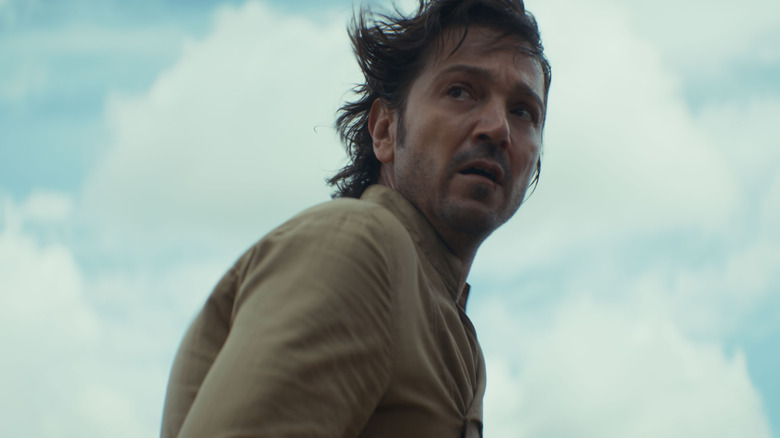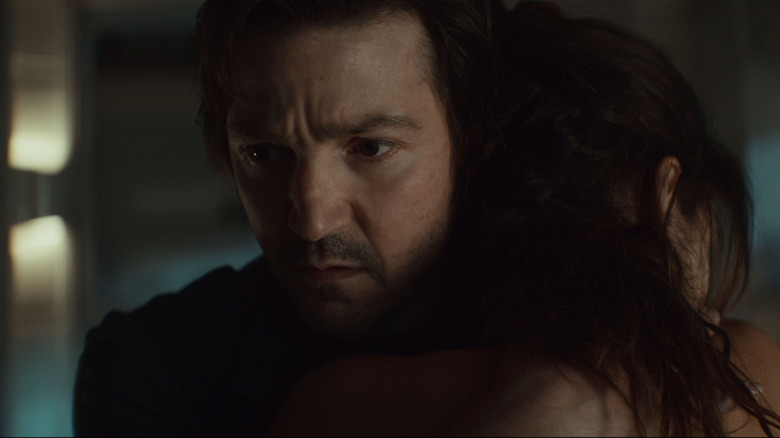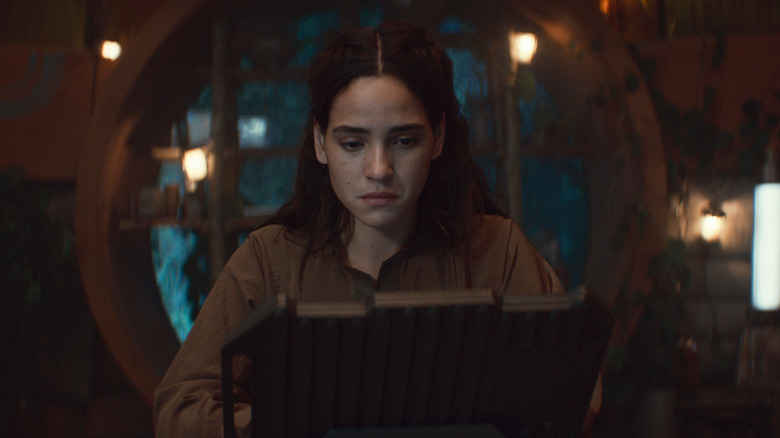How Diego Luna Feels About Rogue One's Ending After Andor
Not to sound like a broken record, but "Andor" is the best thing to happen to "Star Wars" in over 40 years. It's a masterpiece of a television show, one with a great ensemble of actors, meticulous production design (the kind that puts the show's multi-million-dollar budget to fantastic use), and a beautifully written story about the human cost of fighting fascism and the crucial individuals that history erases.
Arguably, however, the show's greatest magic trick is how it manages to remain a consistently thrilling and unpredictable while also serving as a prequel to a prequel. Creator Tony Gilroy and his team deftly avoid the common prequel pitfalls (like spending too much time on unnecessary cameos), and when they do explain things from previous "Star Wars" titles (like the origins of the best line from "Rogue One: A Star Wars Story"), they do so in a way that adds real gravitas and tragedy to what's come before, as opposed to merely shoehorning an origin story in for the sake of it.
Indeed, like the best prequels, "Andor" re-contextualizes the events in older projects, in the process adding so much to "Rogue One" that it almost feels a new movie if you watch it after seeing "Andor" season 2. Whether it's Cassian Andor's (Diego Luna) motivation, the actions of Rebel Command, or even Saw Gerrera's (Forest Whitaker) paranoia, much of the film takes on a whole new meaning now.
That's what Luna thinks, anyway. Speaking with Collider, the actor observed that Cassian's journey in season 2, particularly where it concerns his relationship with Bix (Adria Arjona), adds a lot of context to his sacrifice in "Rogue One." As the actor put it:
"Come on! If you see 'Rogue One' now, it's like, damn, the film is just so much more robust emotionally. It's like everything means so much more now, and you understand what's said and what's not said, which is the beauty of 'Rogue One,' because it's a very mysterious film. You don't know much about these characters. Well, now you know."
Diego Luna feels Andor is ultimately a love story
Of course, Luna isn't merely referring to Cassian giving his life so that the Rebellion can gain access to the Death Star plans in "Rogue One." He's also talking about the moment when Cassian hugs Jy Erso (Felicity Jones) right before they're killed by the incoming blast from the super-weapon. Indeed, there was a fair amount of debate among fans about whether or not there was something romantic between the two revolutionaries prior to "Andor," but that was before they learned about Cassian's one big love, Bix.
To be certain, there was a lot of speculation about what exactly would happen to Bix in "Andor," much like there was when the "Clone Wars" cartoon revealed that Anakin Skywalker had a Padawan, Ahsoka Tano, "Star Wars" fans had never heard of before. Given that "Rogue One" didn't even include so much as a brief mention of Bix, did that mean the character had already died by the time the film begins? But while it turned out the answer is no, that doesn't make what happens to Bix and Cassian any less tragic. Instead, "Andor" reveals that Bix decided to sacrifice her happiness and love for Cassian, as well as her devotion to the Rebellion, so he doesn't have anyone to lose and can become the Rebel leader he's meant to be.
"I love that, at the end, what we are doing is telling a love story," Luna told Collider. "Everyone focuses, when you talk about a revolution, in loss, in pain, in anger, in injustice, and all of that is there, but behind the revolution, there's love. There's the sense of family and belonging and fighting for the right reasons, and that reason can only be love. I think it's a beautiful way to close this project to remind ourselves what it should be about."
Andor adds all the more emotional meaning to Rogue One
Watching Cassian and Bix work through their relationship struggles and endure so much trauma on "Andor," only for Bix to have to leave it all behind for the sake of a sunrise they'll never get to enjoy together, only adds to the ending of "Rogue One." Similarly, Cassian hugging, but not kissing, Jyn, and the mournful look on his face as he sees the Death Star bearing down on them takes on an even greater meaning knowing that Bix is out there and hoping to see him again, but never will.
Then, of course, we have the final scene in "Andor," in which we find out what happened to Bix and where (and with whom) she ended up. It's not just the perfect ending to the story in "Andor," but it's also a simple scene that adds more meaning to "Rogue One" and the entire original "Star Wars" trilogy. By that point in the show, we already knew Cassian sacrificed everything so the Rebellion could have a fighting chance and had destroyed his life to give others a future. We also knew he could have lived a quiet, happy life with the love of his life before giving it up to fight the Empire. But then to see the fruit of his sacrifice and learn that it was worth it on both a macro level and when it comes to his family, well, that's the kind of prequel work that makes "Andor" so unique.
Gilroy may have added the final shot in "Andor" to end things on an uplifting note, but it does much more than that. Cassian and Bix's love story is more than a key subplot; it's the emotional crux of his greater character journey and the saga of the Rebellion with it.
"Andor" is now streaming on Disney+.


